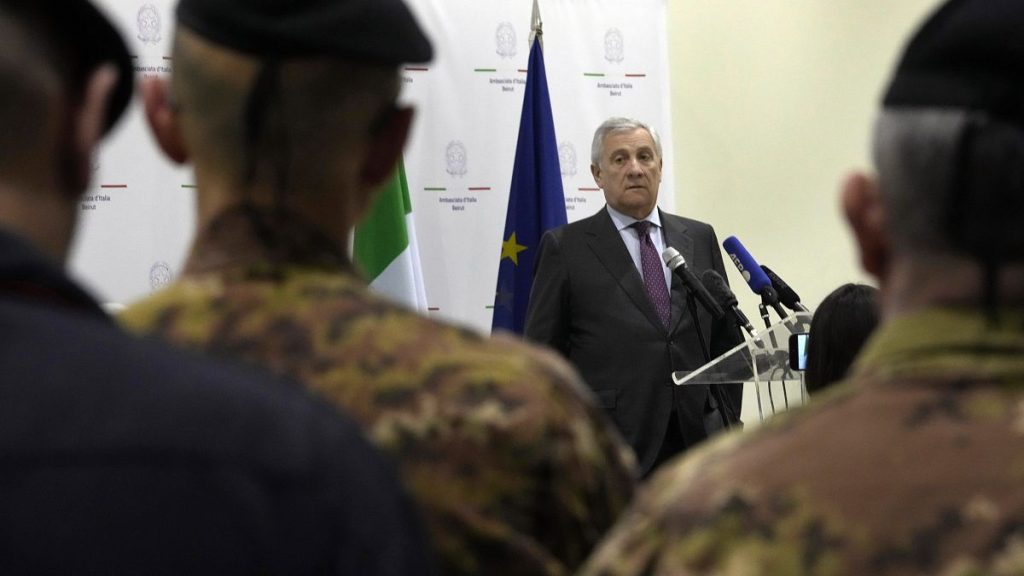Antonio Tajani, Italy’s Foreign Minister, embarked on a diplomatic mission to the Middle East, engaging with key figures in Lebanon and Syria to address regional stability and foster cooperation. His visit to Beirut saw him meet with Lebanon’s newly elected President, Joseph Aoun, where he commended Aoun’s leadership and its potential contribution to regional peace. Tajani underscored the vital role of Lebanon’s stability in bolstering ceasefires in southern Lebanon and expediting a ceasefire in Gaza, emphasizing the urgency of addressing the humanitarian crisis unfolding there. He expressed deep concern for the hostages and casualties, stressing the need for swift action to alleviate the suffering of both the Palestinian population and those held captive.
Further demonstrating Italy’s commitment to regional security, Tajani engaged in a video conference with Italian troops serving in the United Nations Interim Force in Lebanon (UNIFIL). Italy maintains a substantial contingent within UNIFIL, including the Italair unit, a joint forces team operating helicopters. Italair, composed primarily of Italian Army personnel with contributions from the Navy and Air Force, has a long and distinguished history of service in Lebanon, representing Italy’s longest-standing international mission unit. Tajani’s interaction with the troops highlights Italy’s dedication to peacekeeping efforts in the region and the importance placed on the safety and well-being of its personnel serving abroad.
Tajani’s diplomatic efforts extended beyond Lebanon to include a significant visit to Syria, marking the first such visit by an Italian Foreign Minister since the fall of Bashar al-Assad’s regime. In Damascus, he met with Ahmed al-Sharaa, the head of the new Syrian administration, signifying a renewed engagement with the country’s evolving political landscape. Tajani’s meeting with Syrian Foreign Minister, Asaad al-Shaibani, further solidified Italy’s intent to re-establish and strengthen diplomatic ties. He emphasized Italy’s readiness to support Syria’s reform process and expressed a desire to revitalize economic cooperation, positioning Italy as a bridge between the new Syria and the European Union.
The backdrop of Tajani’s visit to Lebanon and Syria is one of complex regional dynamics, marked by ongoing conflicts and humanitarian crises. The situation in Gaza, with its escalating violence and hostage situation, requires urgent international attention. Lebanon’s own fragile stability necessitates continued support from international partners to ensure its ability to contribute to regional peace and security. Meanwhile, Syria’s political transition presents both challenges and opportunities for international engagement.
Italy’s diplomatic initiatives, as exemplified by Tajani’s visit, underscore the country’s commitment to promoting stability and cooperation in the Middle East. By engaging with key players in the region, Italy seeks to facilitate dialogue, support peace processes, and foster economic development. The focus on Lebanon and Syria reflects Italy’s recognition of the interconnectedness of regional challenges and the need for a comprehensive approach to address them.
Italy’s role within UNIFIL also demonstrates its willingness to contribute to international peacekeeping efforts. The long-standing presence of Italian troops in Lebanon underscores the country’s dedication to maintaining stability and security in the region. The recent attack on a UNIFIL base, which wounded Italian peacekeepers, serves as a reminder of the risks faced by those serving in peacekeeping missions and the importance of international support for their efforts. In the context of Tajani’s visit, this incident reinforces Italy’s resolve to contribute to regional security and to stand in solidarity with its partners in the international community.














